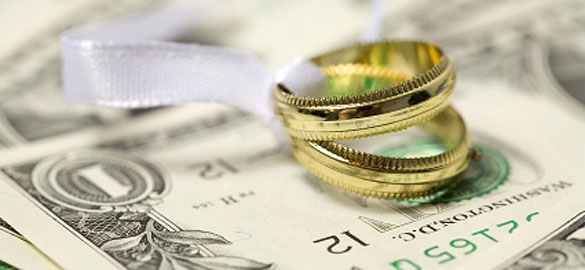The words “romance” and “Internal Revenue Service” typically aren’t found in the same sentence (or maybe in the same book). However, believe it or not, but the IRS has an abiding interest in nuptials. Not because they get teary-eyed as couples march down the aisle, crave second helpings at the chocolate fountain, or want to dance the funky chicken in a state of reckless, inebriated abandonment.
If you’re planning on tying the knot, according to Jeffrey Kahn, an experienced tax attorney and principal of the Law Offices of Jeffrey B. Kahn, the IRS wants to be in your wedding party for five reasons:
- The names and SSN in your tax return must match you SSA records, which means that you probably need to change the latter. You can do this by submitting form SS-5 (you can find it on the SSA.gov), visiting your local SSA office, or calling them at (800) 772-1213.
- After you walk down the aisle, you’ll need to give your employer a new Form W-4 — because you and your spouse’s combined income might send you into a higher tax bracket.
- While the IRS could locate you pretty much anywhere in the solar system, they expect that you’ll tell them if your address is going to change before or after your marriage. Use IRS Form 8822 to do this.
- For tax filing purposes, your marital status for a taxation year is based on whether you’re single or married on December 31. Keep in mind that you and your spouse can file your Federal taxes separately or jointly each year (make sure you do the math so you choose the option that reduces your collective tax liability).
- Generally, you cannot write-off your wedding costs (not even if you met your spouse at work and fell in love amidst the din and buzz of the photocopy room). However, there could be some exceptions. For example, it may be possible to get a tax receipt from a nonprofit organization if you donate the wedding gown. Also, some wedding venue fees are tax deductible if their owned by a nonprofit organization, such as a museum, publicly-owned park, historic house, and so on. And in lieu of giving gifts to your guests, you can make a charitable donation on their behalf.
A Word of Warning
If you do plan on offsetting some of your (massive) wedding costs with tax deductions, ensure that you document everything and keep all receipts, contracts, emails, and so on. It’s also wise to consult with a tax attorney or accountant to make sure that your newlywed joy isn’t interrupted by a costly re-assessment or audit.

